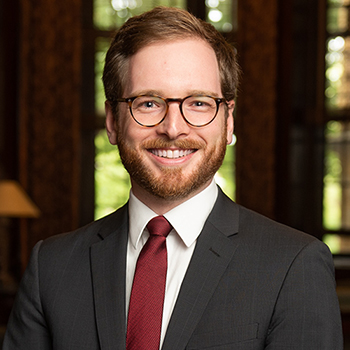Jérémy Boulanger-Bonnelly (SJD 2023)

Whose Justice? A Comparative Approach to Canadian Civil Lay Justice (Thesis)
Graduate supervisors: University Professor David Dyzenhaus, Albert Abel Chair and University Professor Emeritus Michael J. Trebilcock
Awards: Canada Graduate Scholarship in Honour of Nelson Mandela – Master’s Level, SSHRC (2019); Mary & Louis Anisman Fellowship in Law and Fairness, University of Toronto Faculty of Law (2020); Pierre Elliott Trudeau Doctoral Scholarship, Pierre Elliott Trudeau Foundation (2020-2023); Vanier Canada Graduate Scholarship, SSHRC (2020-2023); Best Lawyers 2023: Ones to Watch in Canada™ in Administrative & Public Law and Corporate & Commercial Litigation, Best Lawyers,® 2022; Hommage bénévolat-Québec Award / Young Volunteer category (Claude-Masson Award), Government of Québec (2023)
Although Jérémy Boulanger-Bonnelly (SJD 2023) practised civil law in Montreal full time after graduating from law school, after a while, he realized that his interests in the broader implications of the law might be better suited by an academic career. He applied to the U of T Faculty of Law for entrance into the SJD program and calls his SJD studies “career-defining” given the academic excellence he experienced and the support he received.
“I think it’s one of the best programs in Canada to prepare students for an academic career,” says Boulanger-Bonnelly, now an assistant professor at the McGill University Faculty of Law. “The associate dean and my supervisors supported me in various ways, for instance by reviewing my application materials and helping me practise for interviews.”
His doctoral research focused on access to justice, an interest sparked by his work as a lawyer.
Read U of T News: How COVID-19 shifted public access to Canada's courtrooms online
“In Montreal, when you go to court, there is a room at the courthouse where you are assigned to a judge for your case,” he says. “As a first-year lawyer, I had no idea how to navigate the system, and I realized that people who had no legal training would have no idea what to do, because the system isn’t built for them.”
Access to justice still figures prominently in his research, especially person-centred justice, a concept that has become popular during the past decade, but hasn’t been clearly defined. Boulanger-Bonnelly is part of a group of scholars that seeks to explain the concept with more clarity.
“Person-centred justice is about shifting the focus from the system to the people,” he says. “Reforms previously focused on making the courts more efficient. Now, the focus is shifting to people and how better to provide assistance for them, whether that means the courts or a combination of services.”
He is also passionate about analyzing the importance of juries. They were suspended during the pandemic and Ontario and British Columbia are conducting reviews to see if they are still relevant.
“A lot of the discussion turned on costs and delays, but to me, they are a democratic institution fundamental to our society, with empirical research that demonstrates their benefits,” Boulanger-Bonnelly says.
All of his research and ongoing pro bono courtroom work informs his teaching, which he loves. “It’s really more a discussion about cases and concepts than lectures, and I enjoy that relationship.”